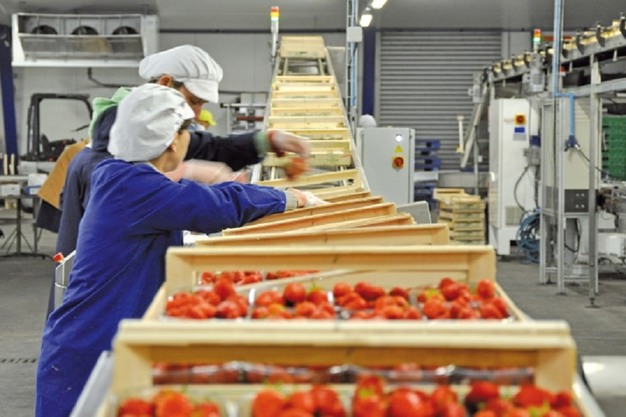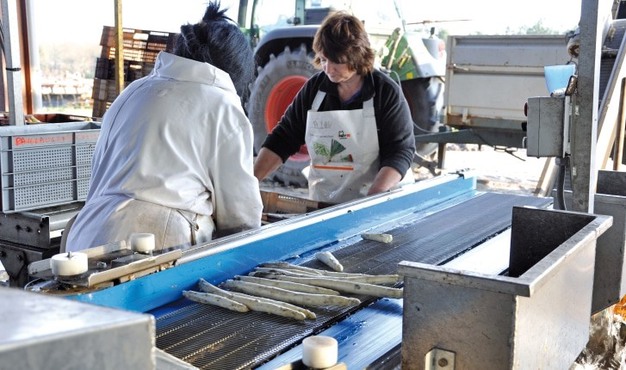"Supporting and developing the consumption of fresh fruit and vegetables" is INTERFEL's main mission, and it works every day to achieve this objective. It's an ambitious goal that requires the industry to constantly rethink its approach, as it is facing a growing labor shortage that ultimately limits the development of French production. Faced with this situation, the Interfel Nouvelle-Aquitaine Regional Committee has decided to tackle the issue head-on, by countering the lack of knowledge about careers in the industry, in particular by raising awareness among young people.

 On 23 May, at a General Meeting chaired by Jean-Hugues Belland (Chairman) and Jean-Louis Chapeyroux (Vice-Chairman), the Regional Committee outlined the latest key production and consumption figures for the Nouvelle-Aquitaine region, followed by a discussion on the appeal of the industry's professions and the skills and training requirements needed to promote the diversity of jobs available in the industry throughout the region.
On 23 May, at a General Meeting chaired by Jean-Hugues Belland (Chairman) and Jean-Louis Chapeyroux (Vice-Chairman), the Regional Committee outlined the latest key production and consumption figures for the Nouvelle-Aquitaine region, followed by a discussion on the appeal of the industry's professions and the skills and training requirements needed to promote the diversity of jobs available in the industry throughout the region.
Right: Jean-Hugues Belland
Setting up a Fruit and Vegetable Primeur CAP to improve training for the industry's professions
"We're realising that the industry is lacking training and that the gap between profiles is huge," comments Jean-Hugues Belland. " A lot of people have a 5-year higher education qualification, but there's very little training between the baccalaureate and engineering level. And yet we have a great need for 2-year post-baccalaureate training. We approached Cap Métiers Nouvelle-Aquitaine and asked them to conduct visits to companies in the sector so that we could support them in implementing a training program that meets the expectations of companies. For the industry as a whole, we have created videos to present the specific features of the jobs in the sector. Lastly, we are promoting training courses such as the CAP Primeur fruit and vegetable course, which is suitable for both primeurs and wholesalers. It's a course with an upstream orientation, and not just a commercial one, as it has been until now.
Raising awareness among young people
These initiatives are backed up by increased communication and awareness-raising in secondary schools: "We often find that the jobs with high-tech functions are the ones that are best known and promoted. Very little is said about the trades that make up our industry. That's why there's a great need to raise awareness among young people. Until now, our industry has been driven by a form of inbreeding, with the children of producers and retailers taking over the business when their parents have retired. But today, the new generation is no longer interested in taking over. Our businesses are perceived as extremely difficult in terms of seasonality and working hours, with few guarantees. And this is getting worse with climate change. It's up to us to widen our horizons and adapt to the expectations of the next generation.

Development of robotization and automation of tasks
According to the President of Interfel Nouvelle Aquitaine, it's entirely possible to restore the image of the sector's professions, as long as we adapt to the expectations of the new generation: "We're working actively with the CTIFL to automate tasks. The automation of harvesting and the processing of goods in warehouses upstream in the sector can provide real comfort for our young people. At the same time, we want to work more closely with organizations like SAFER, for example, to help young producers set up their businesses. In terms of trade, we need to reorganize our work, which isn't easy because it's easier to transport goods at night so consumers can have them first thing in the morning. These are all changes that we didn't realize we needed to make because we didn't need to, but that are now becoming necessary to attract young people to our professions".
Some sectors and areas more affected than others
While all the sectors in the industry are facing labor shortages, it's the upstream sectors that are most affected, especially in the arboriculture sector and remote areas: "Field crops, which are already semi-industrialized, are suffering from this problem, but less so than arboriculture, where some farmers have the financial and land resources to expand, but cannot because it's too difficult for them to take on new staff. In addition, there are two different dynamics affecting different geographical areas: on the Atlantic seaboard, there's less concern about taking over businesses than in the more rural départements. Young people want to be close to the main roads. It's easier to be an arboriculturist 80 km from Bordeaux than from Limoges".
Greater interest in the sector since the Covid crisis
This labor shortage, which has been an issue for many years, has been exacerbated since the Covid crisis, which has nonetheless led to a real awakening: "Up until 2020, the aid for setting up in our region was mainly focused on the aeronautical and wine industries. However, the Covid crisis highlighted the vital importance of the agricultural sector, which is vital for feeding the population. The political authorities have since become much more open to this issue, and a real awareness is emerging.
Latest key figures for the fresh fruit and vegetable sector in Nouvelle-Aquitaine
At the regional level, an average of 830,000 tonnes of fresh fruit and vegetables are harvested each year. Nationally, Nouvelle-Aquitaine is the leading producer of asparagus, carrots, strawberries, kiwis, and hazelnuts. It ranks second for the production of tomatoes, aubergines, raspberries, walnuts, and chestnuts. It comes third for melon, squash, pumpkin, pumpkin and plum production.
In terms of consumption, an average of 158 kg of fresh fruit and vegetables are bought each year by households in the region, for an average budget of €403. The vast majority of these purchases (73%) are made in supermarkets.
The Nouvelle-Aquitaine sector currently represents 5,157 businesses (excluding general supermarkets and institutional catering) and 24,160 FTE (full-time equivalent) jobs, many of them seasonal. Well-established throughout the region, it generates sales of €3.6 billion, including €1.6 billion at the consumer stage.
For more information;
Julia Badets
[email protected]
www.juliarp.com
